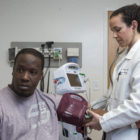Fines & Sanctions
State Disciplines Psychiatrist For Improper Prescription Monitoring, Excessive Drinking
|
The Medical Examining Board issued this week a four-year probationary period to a psychiatrist who is accused of excessive drinking and failing to follow state law on utilizing Connecticut’s prescription monitoring program. Department of Public Health (DPH) investigators determined that Dr. Susannah Tung, a psychiatrist, who runs a private practice while also working for the state Department of Correction (DOC), abused alcohol to excess at least twice; on Oct. 11 2017 and Feb. 20, 2020. The board, in addition to the probation, reprimanded Tung’s license.

